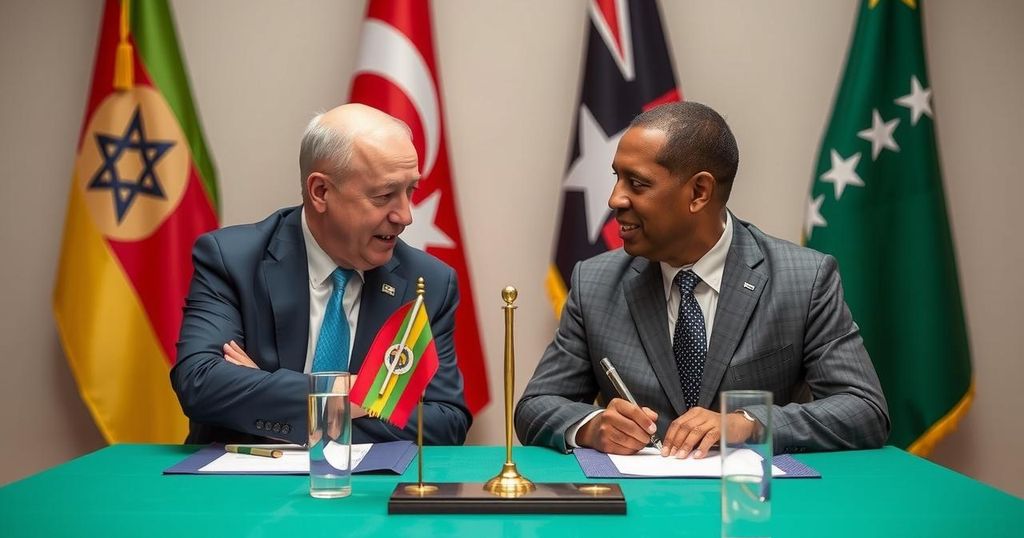Ethiopia and Somalia Forge Historic Agreement for Maritime Access and Sovereignty
Ethiopia and Somalia have signed the Ankara Declaration, a landmark agreement brokered by Turkey that enables Ethiopia access to the sea through Somali territory while affirming Somali sovereignty. Both nations aim to enhance economic cooperation and move past prior disputes, with technical negotiations set to start soon.
A landmark agreement known as the “Ankara Declaration” has been established between Ethiopia and Somalia, enabling Ethiopia to gain access to the sea through Somali territory while reaffirming Somali sovereignty. Brokered by Turkish President Recep Tayyip Erdogan, the deal was concluded during a meeting of the two nations’ leaders in Ankara. Under this declaration, both parties pledged to respect each other’s territorial integrity, moving past previous disputes towards achieving mutual prosperity. This agreement arrives following Ethiopia’s earlier memorandum with Somaliland, which had raised tensions with the Somali government and Egypt, emphasizing the current geopolitical dynamics in the region.
The declaration recognizes Ethiopia’s need for reliable maritime access, essential for its economy since it became landlocked after Eritrea’s secession in the 1990s. Ethiopian Prime Minister Abiy Ahmed and Somali President Hassan Sheikh Mohamud acknowledged the benefits of Ethiopia’s secured sea route while committing to collaborative commercial arrangements under Somalia’s sovereignty. This cooperative approach aims to bolster both nations economically while respecting Somalia’s territorial unity.
Following the announcement, the two countries are set to initiate technical negotiations by the end of February, with Turkey acting as a facilitator to finalize the agreement details. Turkish officials believe this agreement showcases a newfound capacity for conflict resolution between Ethiopia and Somalia. The accord also highlights Somalia’s appreciation for Ethiopian contributions to regional peacekeeping efforts against insurgencies. This agreement not only presents Ethiopia with an alternative trade route but also serves as a strategic counterbalance amid ongoing regional security concerns, including maritime threats in the Red Sea.
The Ankara Declaration signifies a crucial step towards alleviating Ethiopia’s long-standing economic dependency on Djibouti for maritime access. Ethiopian leaders have long expressed the sentiment that sea access is a matter of national survival, viewing the Red Sea as their “natural boundary.” As the most populous landlocked nation globally, this deal opens potential for economic diversification and reduced vulnerability to regional tensions, particularly with the backdrop of recent defense collaborations between Cairo and Mogadishu meant to counter Ethiopia’s influence. The developments suggest a transformative phase in the commitments of the two nations and the strategic mediation role of Turkey within the Horn of Africa.
The agreement between Ethiopia and Somalia comes in the context of historical tensions concerning territorial integrity and maritime access. After losing its access to the sea due to Eritrea’s secession, Ethiopia has been reliant on Djibouti for its international trade. Meanwhile, Somalia’s territorial claims have fostered disputes, particularly in relation to the autonomous region of Somaliland. The backdrop of regional power dynamics, particularly involving Egypt’s opposition to Ethiopia’s actions surrounding the Nile dam, complicates the geopolitical landscape in which these negotiations are occurring. The Turkey-mediated deal represents significant diplomatic efforts to resolve longstanding issues and deepen collaboration between these neighboring countries, aiming for mutual economic and security benefits.
In summary, the Ankara Declaration marks a significant diplomatic milestone for both Ethiopia and Somalia, recognizing the need for collaborative efforts to enhance economic prospects and affirm territorial integrity. With Turkey playing a mediating role, the agreement offers Ethiopia a vital sea access opportunity while fostering Somali sovereignty. Moving forward, the negotiations slated for early 2024 are pivotal in defining the practical implications of this landmark deal, which holds the potential to reshape regional relationships and address longstanding grievances.
Original Source: www.thenationalnews.com




Post Comment